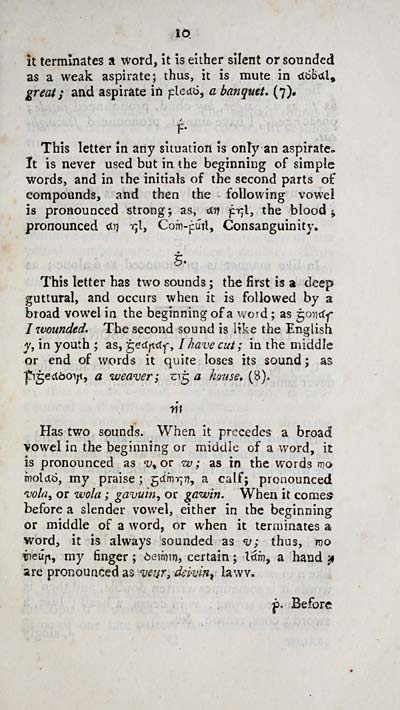Download files
Complete book:
Individual page:
Thumbnail gallery: Grid view | List view

16
it terminates a word, it is either silent or sounded
as a weak aspirate; thus, it is mute in ú6húl %
great; and aspirate in pledó, a banquet. (7).
This letter in any situation is only an aspirate»
It is never used but in the beginning of simple
words, and in the initials of the second parts of
compounds, and then the following vowel
is pronounced strong ; as, <Xtf ptjk a the blood >
pronounced <íí) ^t, Com-putl, Consanguinity.
This letter has two sounds ; the first is 2 deep
guttural, and occurs when it is followed by a
broad vowel in the beginning of a word ; as gondf
I wounded. The second sound is like the English
y, in youth ; as, gettyuiy, Í have cut; in the middle
or end of words it quite loses its sound; as
pgectóoijt, a weaver; tig a house. (8).
•w'f
Has two sounds. When it precedes a broad
vowel in the beginning or middle of a word, it
is pronounced as v % or w; as in the words mo
molctó, my praise ; gtfm^n, a calf j pronounced
vola, or wola ; gavuin, or gawin. When it comes
before a slender vowel, either in the beginning
or middle of a word, or when it terminates a
word, it is always sounded as v; thus, mo
ineóp, my hnger ; óeimn), certain ; lám, a hand if
are pronounced as wur t deivin, iawv.
p. Before
it terminates a word, it is either silent or sounded
as a weak aspirate; thus, it is mute in ú6húl %
great; and aspirate in pledó, a banquet. (7).
This letter in any situation is only an aspirate»
It is never used but in the beginning of simple
words, and in the initials of the second parts of
compounds, and then the following vowel
is pronounced strong ; as, <Xtf ptjk a the blood >
pronounced <íí) ^t, Com-putl, Consanguinity.
This letter has two sounds ; the first is 2 deep
guttural, and occurs when it is followed by a
broad vowel in the beginning of a word ; as gondf
I wounded. The second sound is like the English
y, in youth ; as, gettyuiy, Í have cut; in the middle
or end of words it quite loses its sound; as
pgectóoijt, a weaver; tig a house. (8).
•w'f
Has two sounds. When it precedes a broad
vowel in the beginning or middle of a word, it
is pronounced as v % or w; as in the words mo
molctó, my praise ; gtfm^n, a calf j pronounced
vola, or wola ; gavuin, or gawin. When it comes
before a slender vowel, either in the beginning
or middle of a word, or when it terminates a
word, it is always sounded as v; thus, mo
ineóp, my hnger ; óeimn), certain ; lám, a hand if
are pronounced as wur t deivin, iawv.
p. Before
Set display mode to: Large image | Transcription
Images and transcriptions on this page, including medium image downloads, may be used under the Creative Commons Attribution 4.0 International Licence unless otherwise stated. ![]()
| Early Gaelic Book Collections > Hew Morrison Collection > Practical grammar of the Irish language > (23) |
|---|
| Permanent URL | https://digital.nls.uk/76734431 |
|---|
| Description | A selection of items from a collection of 320 volumes and 30 pamphlets of literary and religious works in Scottish Gaelic. From the personal library of Hew Morrison, the first City Librarian of Edinburgh. |
|---|
| Description | Selected items from five 'Special and Named Printed Collections'. Includes books in Gaelic and other Celtic languages, works about the Gaels, their languages, literature, culture and history. |
|---|

